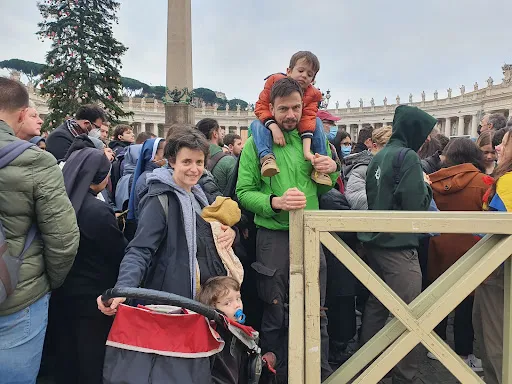 Theologian Monsignor Piero Coda speaks during an Oct. 27, 2022, press conference at the Vatican to present a working document of the Synod on Synodality. / Photo credit: Daniel Ibanez/CNA
Theologian Monsignor Piero Coda speaks during an Oct. 27, 2022, press conference at the Vatican to present a working document of the Synod on Synodality. / Photo credit: Daniel Ibanez/CNA
Rome Newsroom, Oct 27, 2022 / 12:50 pm (CNA).
The Holy Spirit is at work in the latest document of the Synod on Synodality, presenters said Thursday at a press conference on the guiding text for the next stage of the synod’s discussions.
The document, or “synthesis of the syntheses,” Cardinal Jean-Claude Hollerich, S.J., said, “is therefore not a writing emerging out of theological writings. It is the fruit of the lived synodality, the lived theology, a dimension of the life in the Church.”
“And, what is very beautiful, we were able to notice that the Holy Spirit is at work,” he said at an Oct. 27 presentation of the 44-page working document that will guide the next stage of synod discussions: the Continental Assemblies to be held between January and March 2023.
Hollerich, who has one of the most important positions in the Synod on Synodality as relator general, spoke at the press conference via video call from Japan.
The document notes diverse challenges the Church faces worldwide, such as increased secularization, forced conversion and religious persecution, lack of structures for people with disabilities, and clericalism.
The document covers issues across a broad spectrum, from the clergy sexual abuse crisis to Christian unity. The text calls for “a Church capable of radical inclusion” and says that many synod reports raised questions about the inclusion and role of women, young people, the poor, people identifying as LGBTQ, and the divorced and remarried.
It also identifies the celebration of the Mass, whether according to the pre-Vatican II missal or the post-Vatican II liturgy, and access to the Eucharist as “knots of conflict” in the Church and cites a great “diversity of opinion” on the subject of priestly ordination for women, which some reports called for and others considered “a closed issue.”
Present in the hall Thursday, theologian Monsignor Piero Coda of the International Theological Commission also pointed to the presence of the Holy Spirit in the document.
“The theological value of this document, of this text, is derived from the fact that, as we read, it is laden with the treasure contained in the account of the experience of hearing the voice of the Spirit from the People of God,” he said. “This is its significance.”
“The text that we have in our hands,” Coda continued, “has this precise purpose: to offer to the local Churches, to the diverse dioceses of the world, the opportunity to listen to each other’s voices in view of the Continental Assemblies.”
The working document released Oct. 27 was described by presenters as an intermediate document to be used for reflection and as a guide to the discussions to take place in the Continental Assemblies from January to March 2023.
After the synod’s Continental Assemblies, organizers of the gatherings will produce short reports that will be used to create the “instrumentum laboris” in June 2023.
The first of what will now be two general assemblies of the Synod of Bishops will take place Oct. 4–29, 2023, at the Vatican. The second session will be held in October 2024.
Multiple presenters, which also included Cardinal Mario Grech, head of the Synod of Bishops, emphasized Thursday that the Synod on Synodality is still “in a listening phase.”
Cardinal Hollerich said that the working document, titled “Enlarge the space of your tent,” “is not an ‘instrumentum laboris.’”
The “instrumentum laboris” of a synod is typically the document created after consultations and research into the topic the synod is meant to address; it is used as the base text for a general assembly of bishops at the Vatican.
Anna Rowlands, an associate professor of Catholic social thought and practice at Durham University in the United Kingdom, participated in the drafting of the working document and in its presentation.
She said: “We read every report — I really need to stress that — we read every report and individual submission carefully and prayerfully.”
Grech also called the document “a faithful rendering of the syntheses.”
The working document, also referred to as the DCS (Document for the Continental Stage), summarizes the reports shared with the Vatican by bishops’ conferences, religious congregations, departments of the Roman Curia, lay movements, and other groups and individuals.
